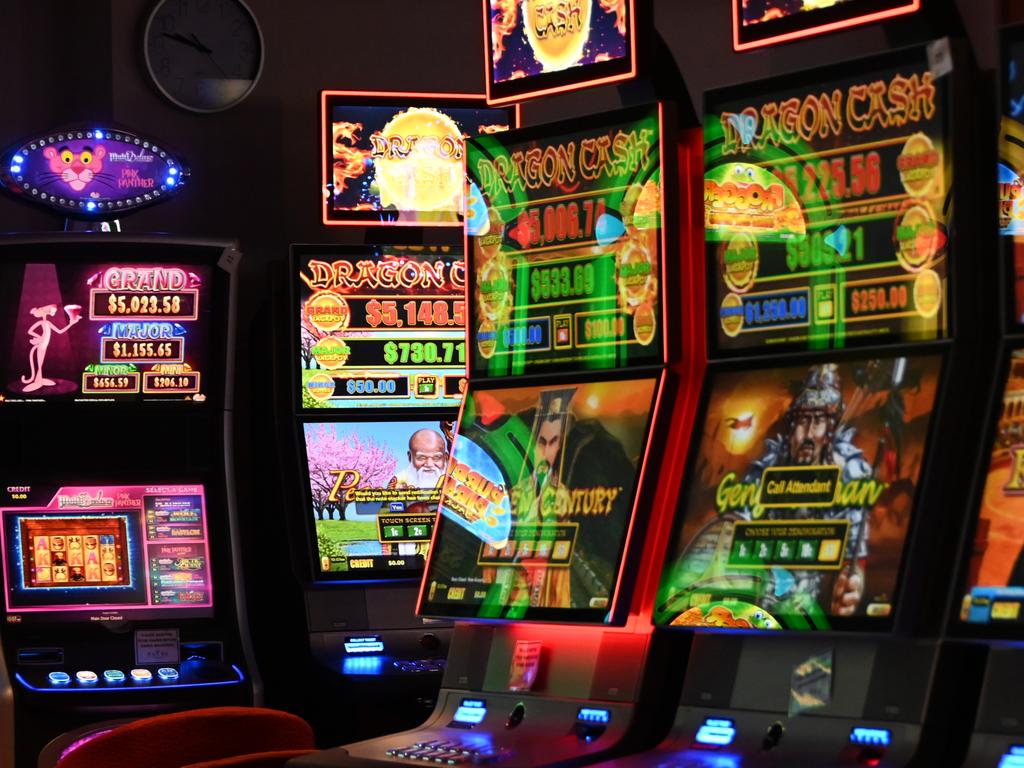Data reveals NT’s club and hotel pokie hotspots and where the most money is lost
Territorians are losing more than $360,000 a day as the worst club and hotel pokie hotspots can be revealed. Search our interactive table and see how your suburb compares.
More than $133 million was lost on poker machines in the Northern Territory’s hotels and clubs last financial year – an average of more than $360,000 a day.
While the largest loss was recorded in Darwin, NT’s slots hot spot was Tennant Creek, with roughly one electronic gaming machine for every 38 people and an average loss of about $1300 per capita.
Department of Industry, Tourism and Trade data revealed NT hotels and clubs recorded net gambling revenue – money played minus prizes won – of $133,814,079 through electronic gaming machines in the year to June 30, 2022.
This was down on the previous year’s $147,512,997.
Additional money was made – that is, lost by players – on casino poker machines, but this is not included in the data as casinos do not report revenue in the same way.

The largest hotel and club pokies losses were in Darwin ($62.1 million last financial year) and Palmerston ($28 million).
Meanwhile, Tennant Creek had the highest concentration of pokies, with an estimated population of about 3080 given access to 81 machines – one for every 38 residents.
It was followed by Katherine (one machine for every 83 people) and Darwin (one for every 120).
University of Sydney Gambling Treatment and Research Clinic director Sally Gainsbury said people continued to gamble during tough financial periods such as high inflation even though it seemed counterintuitive.
“Gambling is very accessible and the idea of a jackpot can be increasingly alluring to people in situations of financial distress,” the psychology professor said.
“(Another big reason people are gambling now) is that the mental health consequences that are coming out of Covid are very acute and we know that there is a very high correlation between mental health comorbidity and gambling problems – that when you’re experiencing anxiety or distress and other mental health issues, gambling is often a maladaptive coping mechanism.”

Professor Gainsbury said industry needed to take more responsibility for minimising gambling harm.
“Particularly where there are gaming machines, they needs to be dedicated staff, not just to make sure those rooms are clean, but to have conversations and check on customers,” she said.
“Venues should also be recording any instances there are of observable signs of gambling problems.”
Signs may include spending more than three hours gambling in a day, emotional outbursts, or comments such as “I really needed that win today”.
Professor Sainsbury supported the use of facial recognition technology that identified problem gamblers trying to enter a gaming area.
In SA, venues authorised to operate 30 or more gaming machines must have approved facial recognition technology installed to identify barred patrons.
Similar solutions have been proposed in other states and territories.
A Department of Industry, Tourism and Trade spokeswoman said one measure the NT government had taken to address harm associated with gambling was reducing the cap on the number of poker machines from 1734 in 2019 to 1699 in 2020.
“The NT Government offers grants through the Community Benefit Fund that support gambling harm amelioration services and research and community projects funded through a levy on poker machines in hotels and casinos,” she said.
MONEY LOST BY REGION
Money lost on hotel and club poker machines in the year to June 2022.
Darwin: $62,139,523
Palmerston: $27,994,865
Alice Springs: $12,130,919
Katherine: $9,509,583
Tennant Creek: 0$4,002,893
Rest of NT: $18,036,295
SLOTS HOT SPOTS
Concentration of hotel and club poker machines
Tennant Creek: 1 machine for every 38 people
Katherine: 1 for every 83
Darwin: 120
Palmerston: 184
Alice Springs: 216
Rest of NT: 419





